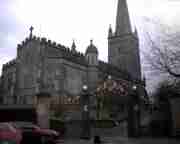|
Home
|
Derrys association with shirt making
|
The history of outworking.
|
The advent of shirt making in factories.
|
Memories.
|
 |
||
|
William Scott.
|
The founder of the shirt industry in Derry has been a man of relative obscurity. It was not any of the names that we normally associate with the industry such as Tillie, Henderson, Hogg or Welch but rather it was a man by the name of William Scott.
The youngest of three brothers, he was born on the 12th March 1765
on a small farm at Balloughry, Co. Derry. He was born into a Presbyterian
family that came to Derry during the Ulster Plantation in 1610. He spent
all his working life as a weaver in the city, first as an apprentice to
Mr. Gilmour of Artillery Street and then in his own business in Weavers
Row. The Scott family business, in which the men did the weaving and the
women made up the garments, was one of the first to supply the new demand.
At the age of 66 he saw that there was a growing demand in the cities
of Britain and beyond for cotton shirts with embroidered linen fronts.
In 1831, he got his wife and daughters to make up a few shirts with which
he boarded the steam ship 'Foyle' bound for Glasgow on what was a journey
of some 26 hours at that time. He took these shirts to his main customer
who was a Mr. William Gourlie & Son of 8 South Frederick Street, Glasgow.
These were an immediate success and orders soon followed from Glasgow,
London and as far away as Australia. The orders from Australia were ordered
by a draper in Shipquay Street on behalf of his brother who had a business
there.
 |
||
|
Shirt makers working from home.
|
 |
||
|
Former site of William Scotts first factory
at Bennett Street.
|
The constant comings and goings of carts from the stations to Scott's
weaving shop made it neccessary for the family to open larger premises
in the Old Military Hospital in Bennett Street in 1840. At the new site
there was enough space for weavers, cutters and sewers, who prepared the
materials for the outworkers; and for the examiners and for the packers
who organised the finished goods for despatch. Also the yard could accomodate
the expanding fleet of horse drawn carts. In 1845 the Londonderry Journal
reported that William Scott 'gave employment to no fewer than 250 weavers
and upwards of 500 persons making shirts'. By 1850 his business had
grown to such an extent that the wage bill of William Scott & son
of £500 per week was one of the highest in the city. In the 1850's,
Scott's initial success attracted a number of other British businessmen
who brought with them new methods of factory organisation and new technology
in the form of the sewing machine.
The shirt industry in Derry grew in the space of 50 years from virtually
nothing to become the principal seat of the shirt industry in the U.K.
and exported to all over the world and was to be the mainstay of the city's
economy for over a century.
In 1850, William Scott retired to his farm at Burt. He later died in 1858 at the age of 93, the father of at least nine children and an elder in the Presbyterian Church for seventy years. His tombstone can be seen in the graveyard of St. Columbs Cathedral in Derry.
 |
 |
|||
|
St. Columbs Cathedral Derry
|
William Scotts grave in St. Columbs Cathedral
Derry.
|
|
Top of page.
|